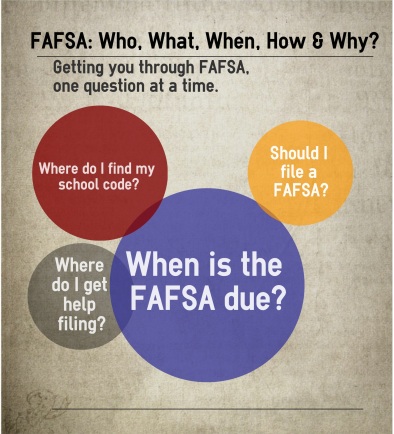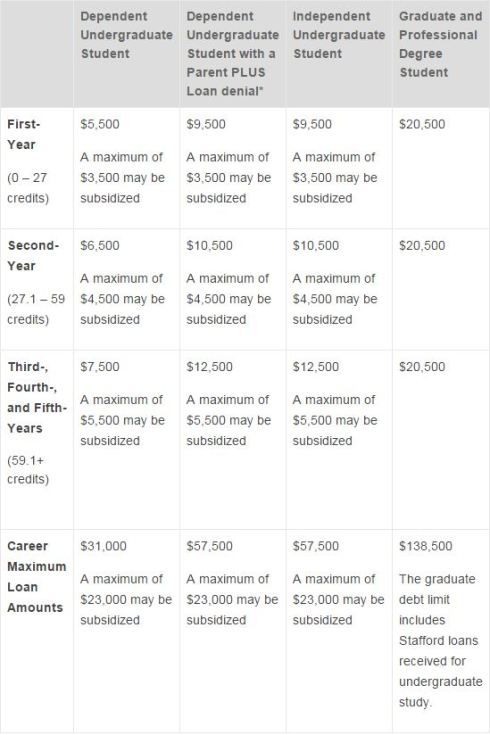
Getting you through FAFSA, one question at a time.
-
Who
- Who Should File a FAFSA?
If you are interested in getting any Federal Financial Aid, including federal direct loans, you need to file the FAFSA at www.fafsa.gov/ to become eligible. Federal loans are almost always preferable to private loans. In addition, many colleges’ need-based scholarships rely on FAFSA information to verify that you are eligible. In short, everyone should file the FAFSA – even if you don’t think you’ll qualify for any federal aid
- Whose Information is Needed to File a FAFSA?
This answer depends on if you are a dependent student or not. Unsure if you’re Dependent or Independent? Check here.(Note: this is not the same as being independent for tax filing)Dependent students: You need tax information for both you AND your parents. If your parents are divorced, you need the information on whoever you receive the most support (51%) from.Independent students: You only need your own information unless you are married. If so, you will need your spouse’s information as well.
- Who Should File a FAFSA?
-
What
- What is the FAFSA Anyway?
The FAFSA is the Free Application for Federal Student Aid.
- What Do I Need to Fill it out?
You’ll need a computer, your school codes, and items on the FAFSA checklist.
- What If Things Change After I File The FAFSA?
If your family situation has a significant change after you’ve filed your FAFSA, and any time while you’re in school, stop by your Financial Aid office to see if you qualify for a “special circumstance”. These could include job loss, divorce, death of a parent, child birth or other unexpected situations that impact your financial status.
- What Types of Federal Financial Aid are there?
There are three main types of financial aid:
1. Grants — Federal Pell Grants do not have to be repaid and are sometimes referred to as “gift aid”. Grants are similar to scholarships, except that they are often for those who demonstrate financial need, where scholarships can be either merit-based or need-based.2. Student Loans — This is the type you hear about most often. Filling out the FAFSA is required to be eligible for Federal Direct loans. Federal loans are almost always preferable to private loans from lending institutions, because they have fixed interest rates and flexible repayment options.3. Federal Work Study (FWS) — Work study may provide you with more opportunities to find on-campus jobs. Rather than being given the funds in the beginning of the semester like loans and grants, FWS earnings are distributed to you as part of your paycheck.
- What is the FAFSA Anyway?
-
Where
- Where Do I Go to File the FAFSA?
Always go to FAFSA.gov to file your FAFSA! There are some other websites that will fill it out and charge you a fee at the end. Filling out the FAFSA should always be free.
- Where Do I Get the School Code and FSA ID?
You’ll need the school code for whatever schools you are interested in applying to. They are available here. Your FSA ID is used to login and electronically sign your FAFSA. Set it up at here.
- Where Do I Get Help?
College Goal Sunday will be held on Sunday, February 21st at 2:00 p.m. in Indiana and it provides FREE FAFSA filing assistance. It is at Ivy Tech in West Lafayette, but to find a location near you in one of the participating 42 states, go to www.CollegeGoalSundayUsa.org. You can always call the Financial Aid office of your prospective school to ask questions as well.
- Where Do I Go to File the FAFSA?
-
When
- When Can I start the FAFSA?
You can begin the FAFSA any time after January 1st of the year you plan to attend college. The FAFSA uses the student/parent tax information from the previous year. You can estimate the required information to beat a college priority filing date, but the info must be corrected after the taxes are complete!
- When is the FAFSA Due?
If you are a Purdue student, the FAFSA priority filing date is March 1st, so be sure to have it done by then! Other colleges (and states) have their own priority dates. Check for deadlines here.
- When Can I start the FAFSA?
-
How
- How Do I Get my Financial Aid?
Your financial aid is sent directly to your school and they will apply it directly toward your billing and send any excess aid to you to be used for books and other education related expenses. The exception is Work Study which needs to be earned by working, and is paid via a paycheck.
- How Much is the Maximum That Can be Borrowed?
Most students don’t know this, but there is a maximum amount of Federal Loans you can take out each year. There is also a maximum amount you can take throughout your college career! If you take the maximum amount for four years, there won’t be as much left for a fifth year if needed. Plan ahead!Remember: Everything you borrow you will have to pay back with interest for the next 10 (or more) years. For every $5,000 you borrow at 6% interest, you pay back $6,661.23 over 10 years ($55.51/ month)
- How Do I Get my Financial Aid?
-
Why
- Why Should I Do a FAFSA?
Other than qualifying for grants and Federal Loans? Many state grants and institutional scholarships require FAFSA information submitted. Even if you aren’t sure, it is always worth submitting!
- Why Should I Do a FAFSA?

